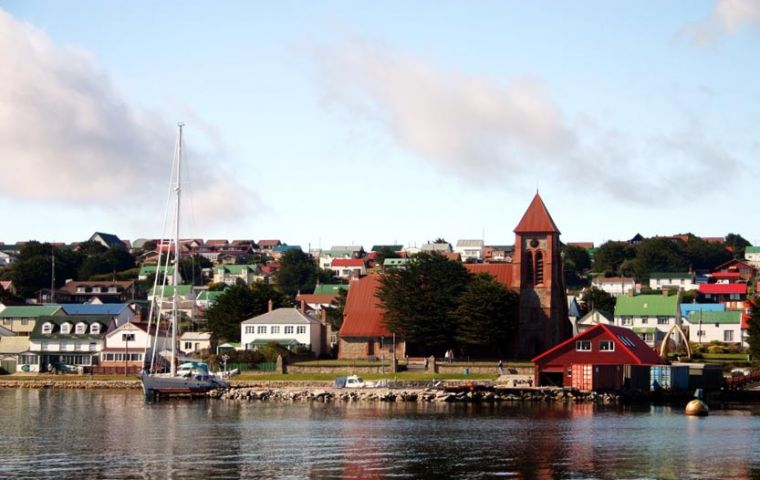MercoPress. South Atlantic News Agency
“Falkland Islands don’t want to join Argentina”
 A view of Stanley where almost two thirds of the Falklands population lives
A view of Stanley where almost two thirds of the Falklands population lives From Monday's Globe and Mail (*)
The Falkland Islands, a windswept archipelago in the South Atlantic Ocean, are a British Overseas Territory, and have been since 1833. The 3,000 inhabitants of this Island are proud to be British subjects, and no amount of Argentine huffing or puffing will change that.
The bellicose attempts by Argentine President Cristina Fernandez de Kirchner to challenge the Island’s sovereignty, and to engage in efforts to disrupt shipping links to the Islands, are without justification. British Prime Minister David Cameron is right to reject such challenges, and to reiterate the UK firm commitment to the Islands’ prosperity and security.
Ms. Fernandez de Kirchner may gain support at home for exploiting feelings among some Argentines that they have a rightful claim to the Islands, known there as Las Malvinas. Argentina has successfully pressured members in the Mercosur trading bloc, including Uruguay, Paraguay and Brazil, to ban legitimate Falkland Islands flagged vessels from using their ports. There is even unsporting talk that the Argentine Olympic team will deface their national uniforms by including a political statement about the Falkland Islands on them.
The issue, however, is not a colonial one. It is the right of a country to determine its own future. And this right to self-determination cannot be ignored, wished, or shouted away. Falklanders are unlikely to change their minds about their loyalty. The endeavour by Argentina’s military junta to invade the islands in April, 1982 ended in a humiliating defeat, and the withdrawal of Argentina forces. It was widely seen as an unsuccessful attempt by General Leopoldo Galtieri, leader of the military government, to divert attention away from the nation’s economic difficulties.
Ms. Fernandez de Kirchner too faces a difficult year, with rising inflation, declining competitiveness, and accusations of curtailing the media’s freedom of expression, following the government’s move to seize control of the paper used to produce newspaper. Surely the country would be better off addressing these very challenges, than engaging in belligerent behaviour towards its tiny, friendly, and admirably independent neighbour.
(*) The Globe and Mail is a nationally distributed Canadian newspaper, based in Toronto and printed in six cities across the country. With a weekly readership of approximately 1 million, it is Canada's largest-circulation national newspaper and second-largest daily newspaper after the Toronto Star. The Globe and Mail is widely described as Canada's English language newspaper of record.




Top Comments
Disclaimer & comment rules-

-

-

Read all commentsWho in their right mind would want to join with a country of 40 million liars?
Dec 26th, 2011 - 05:45 pm 0Thirty years they've been lying about the Royal Navy.
Hopefully the whole world will now see them for what they are. Dishonest no-hopers with delusions.
The Globe and Mail newspaper......anybody hear of them before ?? who they are ???
Dec 26th, 2011 - 05:52 pm 0Let´s see what other important acredible and reliable newspapers say about Malvinas issue:
1) The Guardian:
The Guardian: “Britain is asleep over Argentina and the Falklands”
“South America is growing in strength and increasingly united. Britain must wake up to this new reality”
“..common sense would suggest that the two countries should meet to negotiate a solution, and that is exactly what Argentina's president, Cristina Fernández de Kirchner, has often suggested..”
www.guardian.co.uk/commentisfree/2011/dec/22/britain-asleep-over-falkland-islands?INTCMP=SRCH
It's time to talk about the Falklands: “Britain should stop behaving like a 19th-century colonial power and start discussing Falkland sovereignty with Argentina”
http://www.guardian.co.uk/commentisfree/2010/feb/25/falklands-sovereignty-argentina-britain?INTCMP=SRCH
Ditch the Falklands: “..It makes no economic or political sense to hang on to the Falklands, but no one will face the truth...”
http://www.guardian.co.uk/commentisfree/2010/feb/25/falklands-sovereignty-argentina-britain?INTCMP=SRCH
Time for Falklands co-operation: Both the UK and Argentina could benefit from diplomatic negotiations over the exploitation of natural Falklands resources
http://www.guardian.co.uk/commentisfree/2010/feb/25/falklands-sovereignty-argentina-britain?INTCMP=SRCH
2) The Independent:
“Time to talk about the Falklands”
suggests the time might have come to defuse the situation in the South Atlantic and take up last year’s offer from US Secretary of State Hillary Clinton to broker between Britain and Argentina.....
But simply ignoring Buenos Aires' claims of sovereignty will not make them go away.
http://www.guardian.co.uk/commentisfree/2010/feb/25/falklands-sovereignty-argentina-britain?INTCMP=SRCH
How self-righteous how magnanimous of Canada to hold such a view....shame it doesn't apply the same attitude to it's own indigenous people which it first near exterminated then ghettoised and even today subjects to an institutional process of subjugation and suppression through denial of the indigenous people's claim to self-determination through the reclaimation of their land.
Dec 26th, 2011 - 05:54 pm 0http://archives.cbc.ca/society/native_issues/topics/1238-6864/
http://archives.cbc.ca/society/native_issues/topics/1238-6864/
http://archives.cbc.ca/society/native_issues/topics/1238-6864/
http://archives.cbc.ca/society/native_issues/topics/1238-6864/
http://archives.cbc.ca/society/native_issues/topics/1238-6864/
http://archives.cbc.ca/society/native_issues/topics/1238-6864/
http://archives.cbc.ca/society/native_issues/topics/1238-6864/
Could it be that canadians shape their opinions on racial identity?
Commenting for this story is now closed.
If you have a Facebook account, become a fan and comment on our Facebook Page!